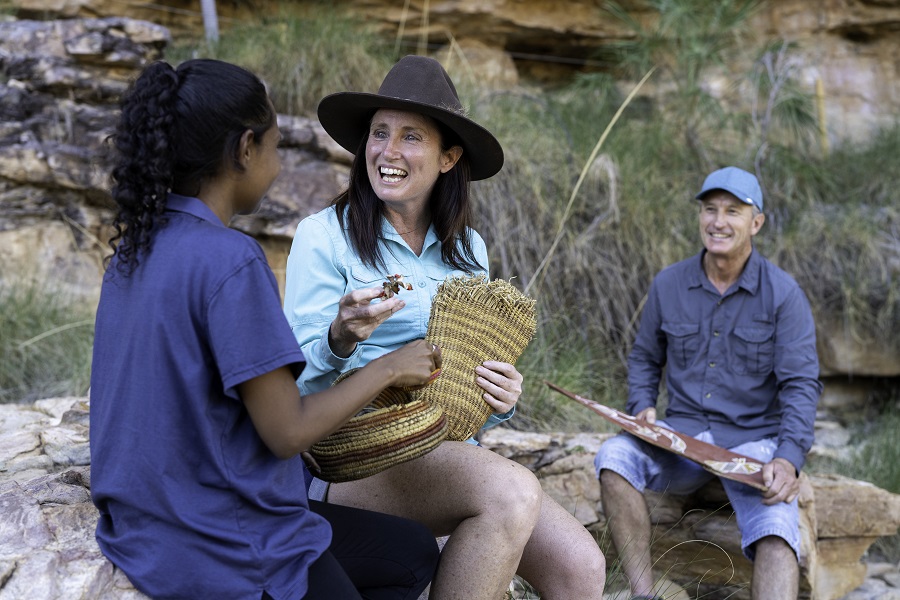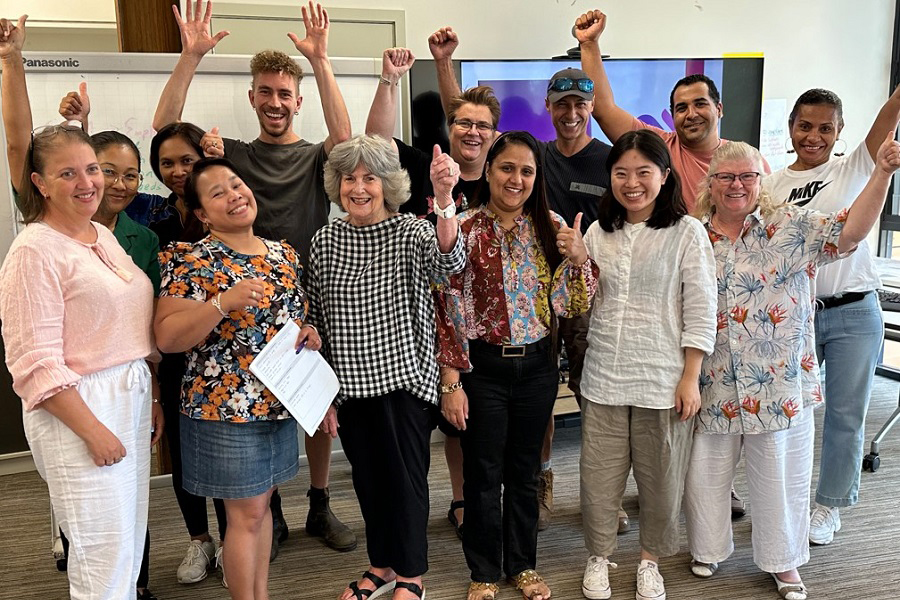Business bulletin: 14 April 2024
Circular economy project rises to top at rural women’s award

Territory entrepreneur, Tanya Egerton has been named the 2024 Northern Territory AgriFutures Rural Women’s winner for her sustainable, ethical and culturally-focused Indigenous enterprise, the Remote OpShop Project.
The AgriFutures Rural Women’s Award acknowledges and supports the critical role women play in rural and regional businesses, industries and communities.
It is an opportunity to celebrate the forward-thinking, courageous leaders who come from industries that represent some of the most vast and remote areas of the Northern Territory.
Ms Egerton, founder and CEO of Circulanation and the Remote OpShop Project, supports the establishment of opshops in remote First Nations communities, providing access to affordable items, while generating independent funding that supports culturally focused projects.
'My goal is to empower more local people to lead these community-owned and operated opshops, so they can drive better outcomes for their communities and the environment by participating in the circular economy,' Ms Egerton said.
'The Remote OpShop Project is developing a reuse and recycling hub ensuring high-quality, affordable goods are redirected from landfill and redistributed to remote First Nations communities, and thanks to the AgriFutures Rural Women’s Award, we will be able to scale with the development of a First Nations Leadership Council that will oversee this game-changing project.'
Ms Egerton received $15,000 from Wespact to further support her project as well as the opportunity to undertake a professional development course of her choosing.
Ms Egerton will go on to represent the Northern Territory at the Agrifutures Rural Women’s Award Gala dinner later this year.
The 2024 Northern Territory AgriFutures Rural Women’s Award finalist’s projects also included:
- Rayleen Brown: for her project which focuses on skill and micro-enterprise development on-country with Central Australian women in the Indigenous bushfoods industry.
- Rashida Khan: for her project ‘Spilling the Tea’ which is aimed at creating new ways for remote and rural Territorians to access mental health and wellbeing programs.
- Rebecca Forrest: her project ‘Youth on Boards’ which focuses on increasing participation of young Territorians on boards and decision making forums.
For more information, visit the AgriFutures Australia website.
Enhancing the Aboriginal tourism industry

NT owned Aboriginal businesses and organisations can now access funding to develop or enhance tourism experiences and product that will encourage visitors to travel to and, stay longer in the Territory.
Aboriginal tourism is a significant drawcard for visitors to the Northern Territory with 80 per cent of visitors to the Territory seeking an Aboriginal tourism experience as part of their itinerary.
Round 7 of the Aboriginal Tourism Grant Program sees $1 million in funding available.
Under the program, eligible business and organisations can apply for grants between $30,000 and $100,000 to upgrade or build new infrastructure or develop a new tourism product which may include on country accommodation, cultural tours and bush tucker experiences.
Aboriginal cultural tourism has been identified by industry as a key priority for the tourism industry, which is reflected in the NT Tourism Industry Strategy 2030. The strategy sets the goal to build capacity and diversity in Aboriginal tourism and increase the offerings.
The Aboriginal Tourism Grant Program supports this goal by helping Aboriginal owned business and organisations develop their tourism products and continue to build stronger visitor experiences.
To date, the grant program has supported 52 Aboriginal tourism businesses with grants worth over $2.3 million.
This program is an initiative under the Northern Territory and Australian Governments $6 million Strategic Indigenous Tourism Projects. This investment is designed to strengthen Aboriginal Territorians participation in Australia’s tourism industry and deliver strong economic outcomes for the Northern Territory.
To find out more and to apply for Round 7 of the Aboriginal Tourism Grant Program visit the Northern Territory Government's GrantsNT website.
To learn more about the NT Tourism Industry Strategy 2030 visit the Tourism NT website.
NT Racing and Wagering Commission nominations now open

Nominations are now being sought for appointment to the NT Racing and Wagering Commission.
The Northern Territory Racing and Wagering Commission (NTRWC) was created under the Racing and Wagering Act 2024 (Act).
The NTRWC will replace the old Northern Territory Racing Commission and will come into effect on 1 July 2024.
The positions include:
- Chairperson
- Deputy Chairperson
- legal member
- 2 other members.
Under the new Act the NTRWC have additional powers to oversee monitoring, complaints, disputes and disciplinary matters of licensed bookmakers.
The NTRWC will be responsible for:
- licensing and regulating bookmakers
- determining betting disputes
- overseeing greyhound racing
- investigating matters relating to racing in the Northern Territory.
All candidates must be residents of the Northern Territory, be fit and proper, and have a demonstrable knowledge or experience of thoroughbreds, harness or greyhound racing industries, the online wagering industry or broader online gambling industry.
Nominations are open until Wednesday, 1 May.
For more information or to submit a nomination, email racing.commission@nt.gov.auor contact 8999 1312.
Skills development exchange program

The Indonesia-Australia Skills Development Exchange Pilot (the SDE Pilot) offers a dedicated pathway for skilled workers in Australia and Indonesia to undertake workplace placements in host organisations in the other country for up to 12 months.
The SDE Pilot was established under the Indonesia Australia Comprehensive Economic Partnership Agreement (IA-CEPA).
The SDE Pilot aims to build the workplace skills and cross-cultural competency of the pilot’s participants, while strengthening cooperation and cultural understanding between Australia and Indonesia.
The SDE Pilot is open to the following sectors:
- agribusiness and food processing
- the creative economy
- financial and insurances services
- the green economy
- information media and telecommunications services
- mining, engineering, and related technical services
- tourism and travel related services.
Other sectors may be considered on a case-by-case basis, as agreed by Australia and Indonesia and subject to the views of industry stakeholders.
Key features of the SDE Pilot:
- Indonesians coming to Australia can take placements in occupations defined at the ANZSCO Skill Levels 1-3.
- All participants can complement their work experience with relevant study or training, as agreed between the participant, their employer, and the hosting organisation.
- Indonesian participants do not need to be sponsored by the Australian host organisation and labour market testing is not required.
All participants must hold relevant licensing or meet related requirements where required by the role and have adequate language proficiency. Placements need to comply with the workplace law in the jurisdiction in which the placement is hosted.
For more information about participating in the SDE Pilot contact DFAT at iacepa.skills@dfat.gov.au or visit the Australian Government's Department of Foreign Affairs and Trade website.
Growing Central Australia’s care sector workforce

Pictured Central Australian Cert IV Community Services students funded through the Fee-Free TAFE initiative
Territorians from diverse cultural and remote locations have come together to undertake training and professional development which will provide a boost to the care sector in Central Australia.
Response Employment and Training are delivering CHC42015 Certificate IV in Community Services to 22 participants at Desert Knowledge in Alice Springs. The course is funded by the Australian Government and Northern Territory Government’s Fee-Free TAFE program.
Central Australians undertaking this qualification are building valuable soft skills in communication, collaboration, technical skills in project management and the ability to proactively manage difficult situations
Kerry Rock, Senior Aged Care and Disability Trainer from Response RTO, has seen substantial professional growth in students during the program.
She said 'The course has seen students successfully develop essential skills, such as building confidence in public speaking, giving and receiving feedback, networking, and respecting cultural diversity.'
'Students have shown a genuine understanding of the importance of collaboration in improving outcomes for their clients in aged and disability support.'
Completing this nationally accredited course leads to more skilled professionals entering the local care workforce and enables career progression for those already in the sector. These skills are transferrable across a broad range of care sector roles, including aged care, disability support services, social work, and health, addressing skills shortages in regional and remote parts of the Northern Territory.
Kerry adds, 'The training has helped participants develop personal and professional confidence, preparing them for career growth and progression as team leaders, coordinators, and supervisors. It also provides skills and knowledge they can apply to potentially open and operate a small disability business.'
The students graduate in June, ready to boost the care sector workforce in Central Australia.
Give feedback about this page.
Share this page:
URL copied!
